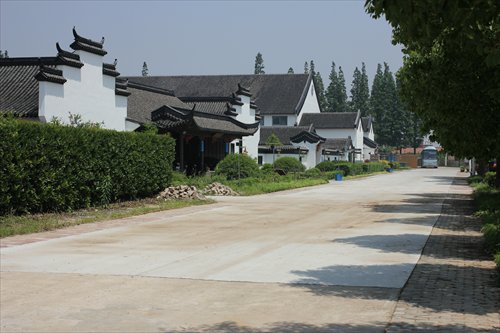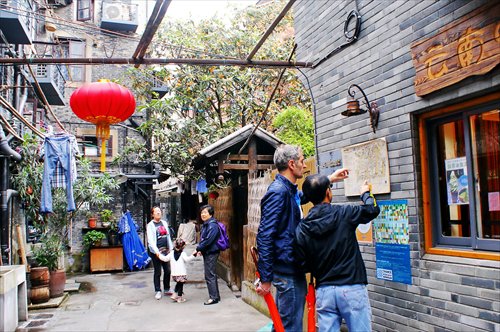HOME >> METRO SHANGHAI
Welcome, visitors – but not yet
By Huang Lanlan Source:Global Times Published: 2015-6-15 17:53:01
Shanghai’s homestay business caught in a legal limbo

One of the Chongming Island homestay homes Photo: IC
Chongming Island turns silent as darkness falls. Few of the old homes on the island still have lights on - most of the residents from here have moved to downtown Shanghai for work.On the island there are now many uninhabited cottages. One of these belongs to Liu Qing, a local designer who worked in the city center and rarely visited home on weekdays. Liu's home is in a small picturesque village with a beautiful name Chunguang - "Spring Scenery." Here grey-tiled and green-walled cottages are scattered among paths shadowed by green trees and shrubs.
In 1984 Liu's father built the home and last year Liu started renovating it, planning to turn it into a guesthouse. He thought this would be a good way to make better use of the house and also be a new source of income. Like his own parents, he thought, older residents who wanted to stay on the island could transform their homes and profit from the homestay business.
At first Liu's parents didn't want him to renovate the house. "They thought that a house should be comfortable but unpretentious, and there was no need to change the decor," Liu said. "But I believe that today the style and appearance of a house are very important and these are things guests take into consideration when they are looking for a place to stay."
A hand-carved treasure
Liu eventually persuaded his parents and then spent eight months renovating the place. He replaced a wooden door with floor-to-ceiling windows, threw out the old stove and created a modern kitchen and improved the floors with new tiles and carpets. He kept some of the old furniture - like the large carved wooden cupboard. When they were first building the house his parents had commissioned local craftsmen to make this cupboard, which is a fine example of hand-carved woodwork, with tiny representations of classical Chinese musical instruments and weaponry adorning it.
"When I was a child and living here, every night before dinner I would see my mother opening this cupboard and taking out our bowls and chopsticks, It's a lovely warm memory for me."
Liu's idea encouraged others to turn their homes into homestay venues for tourists. As Chongming is becoming a popular weekend break destination for Shanghai city dwellers and people from the surrounding provinces, they came to realize that the homestay business could be profitable for the homeowners on the island. "Homestays near some of the tourist attractions in Jiangsu and Zhejiang provinces are very popular now," one Chongming resident explained. "There should be a big market if we can successfully establish a homestay business here."
Some of the more ambitious house owners came to Liu for advice and together they shared thoughts and ideas, looking forward to renovating old homes and creating a homestay island paradise. "Each time we met we brainstormed and came up with new ideas," Liu said. "Each owner now wants to offer a different home theme depending on the history of his home and its features. Some owners want guests to join in and take part in their country life - planting vegetables or helping with farm work for example."
Liu and his partner, an agricultural products sales representative, Zhang Jie, have now established the Chongming Homestay Foundation to help other island residents renovate their houses. "I've successfully turned my house into a guesthouse, and my goal is to build a homestay chain on the island," Liu said.
He has won government backing. Last month, Chongming county launched a program to encourage young entrepreneurs to start their own businesses. "In the past, many locals left their homes and went to work in downtown Shanghai, and now we are seeing many of them come back to start their businesses at home," said Yang Lei, a spokesman for the Chongming county government.

Tourists look around Tianzifang in downtown Shanghai. Photo: IC
Unregistered and unsupervised
Unfortunately, even though Liu and Zhang are optimistic about their plans for a homestay boom on Chongming Island, the industry itself is in a legal limbo - lawyers say that it is difficult for the government to supervise and regulate these unregistered and unsupervised guesthouses.
In Shanghai, with the rapid development of suburban tourism, an increasing number of residents are turning parts of their homes into restaurants and accommodation venues. But most of these places lack fire safety equipment and security, posing hazards for guests if something goes wrong.
Addressing the situation, last July the Chongming county introduced new regulations that homestay residences on the island must adhere to. Now homestay premises there have to provide clean disposable slippers for guests, be air-conditioned and have safes for storing guests' valuables. Homestay homes also have to have at least six beds available and half of the guestrooms should have en suite bathrooms.
But the regulations do not seem to have made much of a difference and red tape still makes the process difficult. According to a report in the Shanghai Morning Post, recently one homestay host in suburban Songjiang district applied for a business license, but was rejected even after consulting eight relevant local government departments. "There are no standards for a homestay residence," he complained. Although perhaps the local government officials he dealt with were unaware of the homestay business as such.
Without government recognition nowadays, many homestays in Shanghai are operating without official approval. "Developing the homestay business is good to take advantage of these unused houses and to attract more tourists here," said one village official in Chongming county who spoke on the condition of anonymity. "Sadly, this legal limbo makes it very difficult to develop the homestay industry along the right lines."
Even downtown
The dilemma can also be found in Shanghai's downtown areas. Tianzifang, the popular hangout and tourist spot in the city's central Huangpu district, has long been the focus of complaints from visitors and residents, not just for its over-commercialized atmosphere, but also for the unregulated homestay venues that have opened there.
Though many Tianzifang residents would dearly love to turn their homes into inns and accommodation, few actually manage to do this, said Wu Meisen, the chairman of the Tianzifang Chamber of Commerce.
For Wu the ideal experience for a Tianzifang visitor should include shopping and visiting art galleries in the daytime, drinking and eating at street cafés and sleeping in a local shikumen (a stone-gated lane house). "It's a shame that most visitors can just stay here for a few hours and then leave," he said. "You cannot experience the real, old Shanghai life without living in a shikumen home for a day or two."
In recent years, local residents have wanted to establish a homestay service center at Tianzifang where tourists could book accommodation and check in and out. The proposal was that the service center would be run by a local management committee, and the Chamber of Commerce. "However, I have talked to the Public Security Bureau, the Housing Administration Bureau and the Tourism Bureau several times, but no one want to help or support this idea," Wu sighed.
Today city homestay hosts want the government to provide official business licenses and, in this way, regulate the industry. "We want the government to regulate homestays by introducing homestay management regulations," said Yuan Qinghua, the director of an agricultural products company on Chongming Island. "Protecting licenced homestays and banning the unlicenced ones - that is the first step in developing this promising business."
Compiled by Huang Lanlan based on stories in the Youth Daily and the Shanghai Morning Post
Posted in: Metro Shanghai, City Panorama